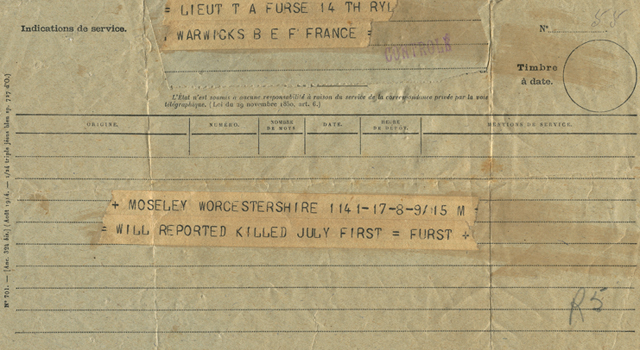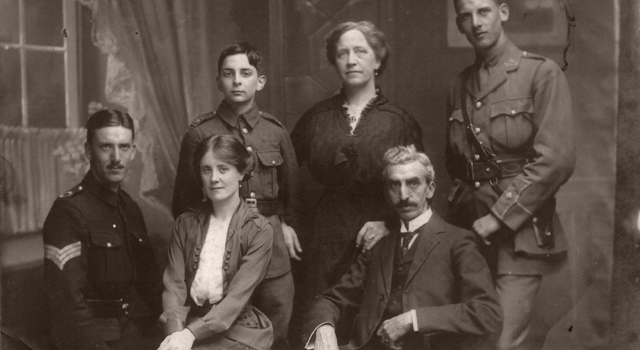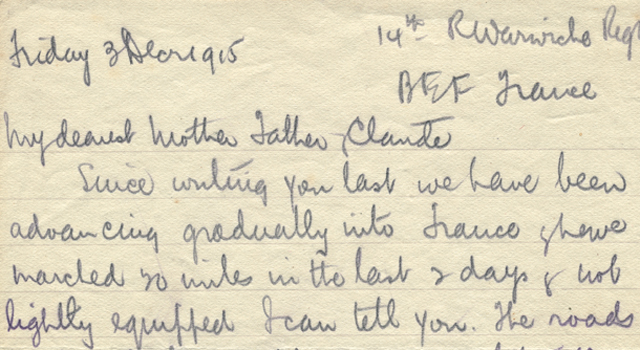Articles
No Comments
By Voices
On 18, Aug 2014 | No Comments | In Cities | By Voices
“The Loss of Such a Splendid Man”
In Memory of Bill Furse
Henrietta Lockhart, Birmingham Museums Trust
During a trip to Northern France in June 2014, I visited the graves of some men whose stories we are featuring in an exhibition about Birmingham and the Royal Warwickshire Regiment during the First World War.
The family photograph and letters reproduced here are part of the collection of Dave Vaux.
![Furse Family Portrait [Courtesy of Dave Vaux]](http://www.voicesofwarandpeace.org/wp-content/uploads/2014/08/furse-family.jpg) Bill Furse and his brother Alan lived in Moseley, Birmingham. When war broke out Lord Kitchener put out an appeal for volunteers, and many white-collar workers joined the so–called ‘Pals’ battalions. Bill and Alan both joined the 1st Birmingham battalion (also known as the 14th battalion) in September 1914. In this photograph Bill is seated to the left hand side, his wife beside him, and Alan is standing on the right.
Bill Furse and his brother Alan lived in Moseley, Birmingham. When war broke out Lord Kitchener put out an appeal for volunteers, and many white-collar workers joined the so–called ‘Pals’ battalions. Bill and Alan both joined the 1st Birmingham battalion (also known as the 14th battalion) in September 1914. In this photograph Bill is seated to the left hand side, his wife beside him, and Alan is standing on the right.
![Letter Home [Courtesy of Dave Vaux]](http://www.voicesofwarandpeace.org/wp-content/uploads/2014/08/furse-letter.jpg) The Furse brothers were middle-class and their background and education would have qualified them for advancement. Both were commissioned to the rank of Second Lieutenant. Alan’s letters home give a vivid picture of life in the British Expeditionary Force. Writing to his parents, he describes the conditions in the trenches:
The Furse brothers were middle-class and their background and education would have qualified them for advancement. Both were commissioned to the rank of Second Lieutenant. Alan’s letters home give a vivid picture of life in the British Expeditionary Force. Writing to his parents, he describes the conditions in the trenches:
‘Whilst on your tour of duty round in the front line you are floundering knee deep in mud and both sides are slimy with mud so that you have nothing clean to steady yourself by and when you get back to your dugout to rest you have the slimy walls and at least a foot of mud on the floor. You soon learn not to drop things as of course they are useless afterwards and the great trouble is to find somewhere to put something down’.
Alan also writes to his teenage brother Claude, who was an Army Cadet. These letters present the war as a great adventure:
‘It is a grand sight to see the anti aircraft guns firing at an aeroplane, little puffs like bunches of cotton wool suddenly appearing all round the plane until he gets out of range…Whilst we were walking back to the wood today a couple of shells fell about 100 yds away and kicked up a devil of a row…They are called Whizzbangs because they are of such high velocity and you get no warning of their arrival, just the whiz thro’ the air and then the explosion…’.
![Telegram, 1916 [Courtesy of Dave Vaux]](http://www.voicesofwarandpeace.org/wp-content/uploads/2014/08/furse-telegram.jpg) Tragically, Alan’s brother Bill was killed on the first day of the battle of the Somme, 1 July 1916. He was 25. Alan was not far away, but he did not hear the news of Bill’s death until several days later when his parents informed him by telegram. Alan’s response to his parents is a prime example of ‘stiff upper lip’, but his grief can be read between the lines:
Tragically, Alan’s brother Bill was killed on the first day of the battle of the Somme, 1 July 1916. He was 25. Alan was not far away, but he did not hear the news of Bill’s death until several days later when his parents informed him by telegram. Alan’s response to his parents is a prime example of ‘stiff upper lip’, but his grief can be read between the lines:
‘Thus goes the finest pal I have ever had and one of the best and most straightforward men who ever lived. Of course the shock has been bad for me but what you must feel at home having to sit still I can’t imagine but you must not give way more than you can help. Try and bear up. God grant you all His help at this awful time and give you strength to bear the loss of such a splendid man’.
I visited Bill’s grave in June 2014. By the time he died Bill had been transferred to the Tyneside Scottish, a brigade formed of ‘Pals’ battalions of the Northumberland Fusiliers. Bill was temporarily buried where he fell, but was transferred to Bapaume Post Cemetery near Albert after the Armistice.
![Bapaume Post Cemetery [Photo: H. Lockhart]](http://www.voicesofwarandpeace.org/wp-content/uploads/2014/08/furse-bapaume-post.jpg) For a couple of days during our trip we actually stayed in a hotel overlooking Bapaume Post Cemetery. Although it is to some extent surrounded by industrial development, it is a very peaceful place with beautiful planting maintained by the Commonwealth War Graves Commission.
For a couple of days during our trip we actually stayed in a hotel overlooking Bapaume Post Cemetery. Although it is to some extent surrounded by industrial development, it is a very peaceful place with beautiful planting maintained by the Commonwealth War Graves Commission.
Alan Furse was discharged on medical grounds later in 1916 and survived the war.





![Gravestone of Bill Furse [Photo: H. Lockhart]](http://www.voicesofwarandpeace.org/wp-content/uploads/2014/08/furse-grave.jpg)

Submit a Comment